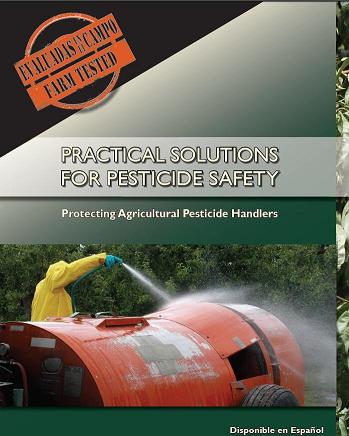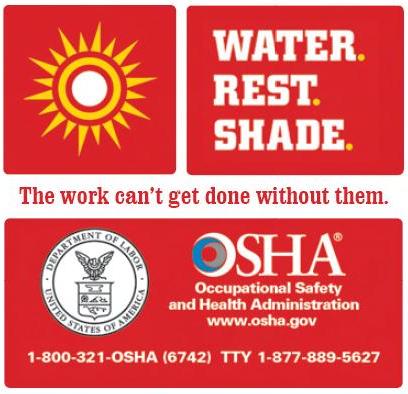In addition to the required certification and recertification training, some employers provide other pesticide or workplace related safety training. It is important that employees not only know how to properly apply pesticides but also understand how to safely use pesticide application equipment and transport pesticides. The hazards associated with working around pesticides extend beyond chemical hazards and include application equipment, transport hazards and environmental hazards. If an applicator hauling pesticides loses control of either the application equipment or transport vehicle, he loses control of the pesticides. Likewise, if an applicator becomes injured while applying pesticides, he may lose control of the pesticide as well.
While it is not required under the Virginia Pesticide Control Act, employers who provide supplemental training related to pesticide safety are encouraged to keep records of their trainings. Records could include a summary of topics discussed, copies of handouts or presentations and a roster of employees who attended the training. The roster should be signed and dated by the trainer or supervisor. Such records can be beneficial if there is a question about an employee’s training and/or qualifications in any specific aspect of pesticide usage.
The following resources are provided as supplemental training resources which may be of interest to agricultural establishments or pesticide businesses for use during employee training related to pesticide or general workplace safety training. Some resources provide information about how employees can protect themselves from the hazards associated with their work. Others will provide them with information specific to a particular aspect of pest management, pesticide use or pest biology and behavior. There are no credits offered when these resources are used unless they are included in a pre-approved recertification training course.
Training Courses Related to Integrated Pest Management
Check with the Office of Pesticide Services to see if credits are available for completing these courses. If not, ask the course sponsor to contact the Office of Pesticide Services (OPS) about getting the course added to the approved list. Even though some courses may cover laws which are specific to the states where they are based, the principles may be applicable to Virginia-based technicians. To find information about industry conferences or meetings, visit the Industry Association page and select the appropriate association. |
Virginia Pest Management Association (VPMA) |
|
|
Virginia Cooperative Extension
The Virginia Cooperative Extension has developed a number of publications for homeowners, professionals and growers that use pesticides. These publication cover a broad band of topics related to pesticide safety and integrated pest management. To find publications visit their Publications and Resources page and select a topic of interest or utilize the search feature to find a list of publications related to the topic you’re researching. Some specific publications of interest are included below. |
|
|
|
|
|
|
Virginia Tech Pesticide Programs (VTPP)
The Virginia Tech Pesticide Programs (VTPP) website offers a number of resources for pesticide applicators including information about certification training, recertification events, online training opportunities and various pesticide safety topics. Click the title above to visit their website or click a quick link below. |
|
|
| Pacific Northwest Agricultural Safety and Health (PNASH) Center |
 Practical Solutions for Pesticide Safety is a guide with 24 pesticide safety measures developed on Washington state farms that use airblast sprayers. Each solution was developed and reviewed in a partnership with farmers, educators and researchers. This resource provides solutions for: mixing and loading; pesticide applicationa and drift; decontamination; emergency and sanitation facilities; pesticide storage; and reducing your family's exposure(s) to pesticides. Practical Solutions for Pesticide Safety is available for free download and viewing from PNASH in both English and Spanish. Practical Solutions for Pesticide Safety is a guide with 24 pesticide safety measures developed on Washington state farms that use airblast sprayers. Each solution was developed and reviewed in a partnership with farmers, educators and researchers. This resource provides solutions for: mixing and loading; pesticide applicationa and drift; decontamination; emergency and sanitation facilities; pesticide storage; and reducing your family's exposure(s) to pesticides. Practical Solutions for Pesticide Safety is available for free download and viewing from PNASH in both English and Spanish.
|
Correspondence Courses, Distance Learning Opportunities and Training Courses(Fee-Based)
The following programs and courses may be of interest to professionals who are seeking more formal training opportunities. Courses and programs which are based in other states may emphasize state-specific laws that are not applicable in Virginia. For more information about these courses and programs, contact the university where they are provided. |
|
|
|
|
|
|
|
Environmental Protection Agency
Office of Pesticide Programs |
|
|
|
|
National Agriculture Center (Ag Center)
The following publications can be viewed on EPA’s National Agriculture Center website or on the National Service Center for Environmental Publications website where they are hosted. In many cases, copies can be ordered online. Some publications are scanned copies of original printed literature which is no longer available in a hardcopy form. |
- A Guide to Heat Stress in Agriculture
|
- Pesticide Safety and Site Security
|
- Personal Protective Equipment Guide Series
- Brush Up On Covering Up*
- Coveralls, Gloves, and Other Skin Protection*
- Choosing Chemical Resistant PPE*
- Protective Eyewear*
|
U.S. Department of Labor, Occupational Safety and Health Administration (OSHA) |
 The Occupational Safety and Health Act of 1970 requires that employers create working conditions that do not pose any known dangers to their employees. One requirement of the OSH Act is the Hazard Communication Standard . Under the Hazard Communication Standard, employers are required to provide employees with training and information related to chemical hazards in their workplace. One piece of information specifically required is the Material Safety Data Sheet (MSDS). Training related to the Hazard Communication Standard falls under the authority of the U.S. Department of Labor, Occupational Safety & Health Administration (OSHA). Related questions should be directed to the Virginia Department of Labor and Industry which operates under a State Plan Program consistent with the provisions of Section 18(e) of the federal Occupational Safety and Health Act. The Occupational Safety and Health Act of 1970 requires that employers create working conditions that do not pose any known dangers to their employees. One requirement of the OSH Act is the Hazard Communication Standard . Under the Hazard Communication Standard, employers are required to provide employees with training and information related to chemical hazards in their workplace. One piece of information specifically required is the Material Safety Data Sheet (MSDS). Training related to the Hazard Communication Standard falls under the authority of the U.S. Department of Labor, Occupational Safety & Health Administration (OSHA). Related questions should be directed to the Virginia Department of Labor and Industry which operates under a State Plan Program consistent with the provisions of Section 18(e) of the federal Occupational Safety and Health Act.
|
|
|
|
|
|
|
|
|
|
|
OSHA Industry Specific Resources |
|
|
|
|
Centers for Disease Control and Prevention
The CDC offers several training and educational resources related to managing public health pests. |
|
|
|
|
|
|
|
|
- Pools & Hot Tubs (Disinfection)-While often not grouped with other pesticide businesses, pool maintenance companies and staff use pesticides regularly to maintain clean aquatic environments for swimming and other recreational use.
|
- Vessel Sanitation Program: Health Practices on Cruise Ships- Although this training was developed for employees on cruise ships, the information provided may be of interest for businesses that perform work in similar environments. Housekeeping and Infection Control focuses on disinfection procedures. Integrated Pest Management focuses on the implementing IPM practices.
|
National Environmental Health Association (NEHA) e-Learning
NEHA offers several courses related to managing health related pests including rodents, ticks,
mosquitos and microorganisms. The Centers for Disease Control and Prevention (CDC) offers some
sponsored programs through the NEHA website. Several of these courses are pre-recorded
workshops or presentations. The CDC courses can be taken free of charge by both members and
non-members. Non-members must register to take the courses.
|
|
|
Ohio State University ExtensionAgricultural Tailgate Training Safety Modules
These modules geared toward Agricultural Employee Safety and Health were developed by staff of the Ohio State University Extension. Packets containing the English and Spanish versions of each module can be downloaded from the site and printed for the training. Specific topics of interest to pesticide applicators are listed below.
|
General Workplace Safety Module Topics |
- Caught-in or Caught-between Objects
|
|
|
- Preventing Machine Hazards
|
|
|
- Material Safety Data Sheet (MSDS)
|
|
Pesticide Specific Safety Module Topics |
|
|
- Pesticide-Contaminated Clothing Laundering
|
|
|
- Restricted Entry Intervals (REI)
|
Purdue Pesticide Programs
Purdue Pesticide Programs has a number of valuable resources for homeowners, commercial applicators and growers. Listed below are some examples of the resources which can be obtained via the Publications page of the Purdue University Extension website |
- Calibrating the Hose Reel Lawn Care Sprayer
|
- Pesticides and Material Safety Data Sheets
|
- Pesticides and Commercial Vehicle Maintenance
|
- Securing the Load (Transport)
|
- Pesticides and Container Management
|
- Stay on Target: Prevent Drift
|
- Pesticides and Fleet Vehicles (Transport)
|
|
University of California |
- UC IPM Online Training Programs--This website currently offers four free online courses, two of which are specifically for retail and garden center employees.
|
University of Nebraska-Lincoln Extension
To search for more pesticide related publications from UNL Extension visit their Publications page. Below are examples of some of the publications available. |
- Maintaining and Fit Testing Cartridge Respirators for Pesticide Applications
|
- Pesticide Safety: Choosing the Right Gloves
|
- Managing the Risk of Pesticide Poisoning and Understanding the Signs and Symptoms
|
- Rinsing Pesticide Containers
|
- Managing Pesticide Spills
|
- Safe Transport, Storage & Disposal of Pesticides
|
National Center for Healthy Housing (NCHH)
The following course was developed by NCHH along with representatives from several state and federal agencies, including the Environmental Protection Agency, the U.S. Department of Housing and Urban Development’s (HUD) Office of Healthy Homes and Lead Hazard Control, and the U.S. Center for Disease Control and Prevention (CDC). The National Pest Management Association also assisted in developing this course. |
- IPM in Multi-Family Housing Course--According to the website, this course was “designed to help property managers, including a public housing authority, implement a comprehensive integrated pest management (IPM) program…” Property managers can use this training curriculum to train staff and tenants (“resident leaders”). It is designed to be used with the active participation of a pest management professional. The information contained in the course may also be beneficial to pest management companies which service multi-family housing or work with property managers to provide IPM outreach to tenants or staff.
A number of other pest management resources are available on Resources page of the National Center for Healthy Housing website. Use the keyword "pest" to create a list of available resources. |
*Note: The Personal Protective Equipment resources provide general information about personal protective equipment (PPE). Always refer to the pesticide label which accompanies the product when determining the appropriate PPE for a specific use. If using multiple products, follow the most restrictive requirements listed.